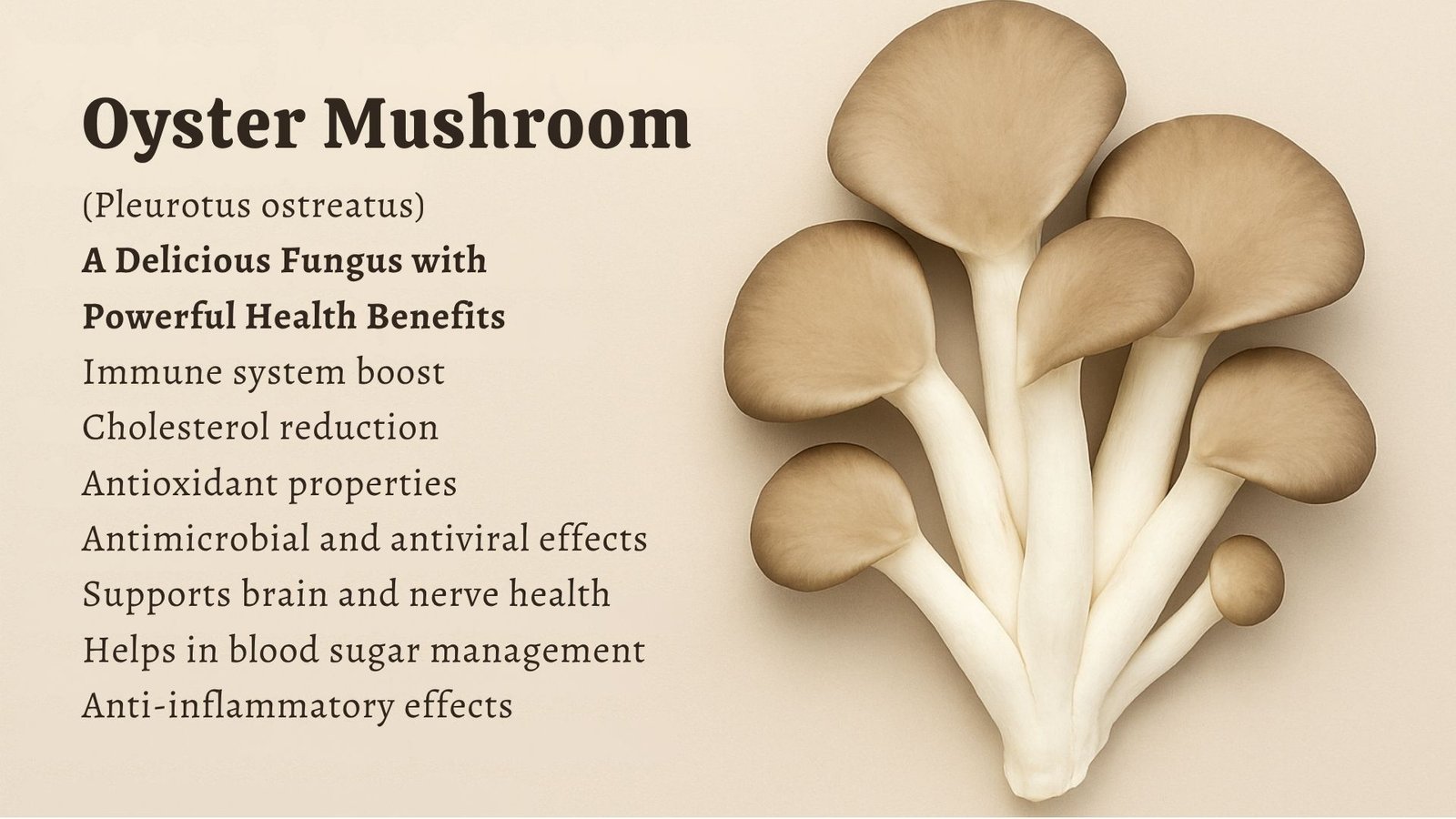Oyster Mushroom (Pleurotus ostreatus): A Delicious Fungus with Powerful Health Benefits
The oyster mushroom (Pleurotus ostreatus) is one of the most popular edible mushrooms globally, prized not only for its unique shape and delicate flavor but also for its impressive nutritional and medicinal properties. Recognizable by its oyster-shaped cap and soft, velvety texture, this mushroom is a favorite among chefs, foragers, and health enthusiasts alike.
Botanical Profile
-
Scientific Name: Pleurotus ostreatus
-
Common Names: Oyster mushroom, tree oyster mushroom
-
Family: Pleurotaceae
-
Origin: Native to temperate and subtropical forests worldwide, often growing on decaying hardwood
-
Cultivation: Grown commercially on various substrates like straw, sawdust, and agricultural waste
Nutritional Composition
Oyster mushrooms are a low-calorie, nutrient-rich food. A 100-gram serving provides approximately:
-
Calories: 33 kcal
-
Protein: 3.3 g
-
Carbohydrates: 6 g
-
Fat: 0.4 g
-
Fiber: 2.3 g
They are also a good source of:
-
B vitamins (B1, B2, B3, B5, B6)
-
Vitamin D (especially when UV-exposed)
-
Iron, potassium, phosphorus, zinc
-
Antioxidants and polysaccharides
Health Benefits
1. Immune System Boost
Oyster mushrooms contain beta-glucans and other immune-modulating compounds that enhance the body’s defense mechanisms and may help in fighting infections and even some forms of cancer.
2. Cholesterol Reduction
These mushrooms are known to contain lovastatin, a naturally occurring statin that helps lower LDL (bad) cholesterol levels, promoting cardiovascular health.
3. Antioxidant Properties
Rich in antioxidants such as ergothioneine and phenolic compounds, oyster mushrooms help combat oxidative stress, slowing cellular aging and reducing inflammation.
4. Antimicrobial and Antiviral Effects
Studies suggest that Pleurotus ostreatus exhibits antimicrobial properties against several bacterial strains and has potential antiviral effects, making it useful for enhancing resistance to pathogens.
5. Supports Brain and Nerve Health
The presence of B vitamins and antioxidants aids in cognitive function and may offer neuroprotective benefits, potentially lowering the risk of age-related cognitive decline.
6. Helps in Blood Sugar Management
Preliminary studies show oyster mushrooms can help reduce blood sugar levels due to their low glycemic index and fiber content, aiding diabetes management.
7. Anti-inflammatory Effects
Bioactive compounds in oyster mushrooms may help reduce chronic inflammation, a key factor in many modern diseases including arthritis and heart disease.
Culinary Uses
Oyster mushrooms have a mild, savory flavor with a tender texture that makes them suitable for a variety of dishes:
-
Stir-fried with garlic, soy sauce, and vegetables
-
Grilled or roasted as a meat substitute in vegan dishes
-
Added to soups, curries, risottos, and stews
-
Breaded and fried for crispy mushroom “wings”
-
Used in pasta dishes or as a pizza topping
They cook quickly and absorb flavors well, making them a favorite in Asian, Mediterranean, and fusion cuisines.
Environmental and Economic Importance
-
Biodegradation: Oyster mushrooms can break down agricultural and plastic waste, making them key players in sustainable agriculture and bioremediation.
-
Low-cost Cultivation: They grow rapidly on inexpensive substrates, making them a sustainable protein source for food-insecure regions.
-
Mycoremediation: Capable of removing heavy metals and toxins from polluted environments.
Conclusion
The oyster mushroom (Pleurotus ostreatus) is more than a tasty addition to meals—it’s a potent superfood with a wide array of health and environmental benefits. From supporting heart health and boosting immunity to offering sustainable solutions for agriculture and waste management, oyster mushrooms are a powerful ally in both personal and planetary health.

